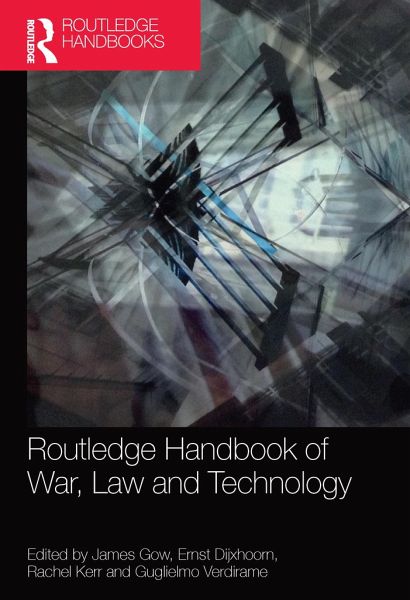
Routledge Handbook of War, Law and Technology
Versandkostenfrei!
Versandfertig in 1-2 Wochen
59,99 €
inkl. MwSt.

PAYBACK Punkte
30 °P sammeln!
This volume provides an authoritative, cutting-edge resource on the characteristics of both technological and social change in warfare in the twenty-first century, and the challenges such change presents to international law.The character of contemporary warfare has recently undergone significant transformation in several important respects: the nature of the actors, the changing technological capabilities available to them, and the sites and spaces in which war is fought. These changes have augmented the phenomenon of non-obvious warfare, making understanding warfare one of the key challenges...
This volume provides an authoritative, cutting-edge resource on the characteristics of both technological and social change in warfare in the twenty-first century, and the challenges such change presents to international law.
The character of contemporary warfare has recently undergone significant transformation in several important respects: the nature of the actors, the changing technological capabilities available to them, and the sites and spaces in which war is fought. These changes have augmented the phenomenon of non-obvious warfare, making understanding warfare one of the key challenges. Such developments have been accompanied by significant flux and uncertainty in the international legal sphere. This handbook brings together a unique blend of expertise, combining scholars and practitioners in science and technology, international law, strategy and policy, in order properly to understand and identify the chief characteristics and features of a range of innovative developments, means and processes in the context of obvious and non-obvious warfare. The handbook has six thematic sections:
Law, war and technology
Cyber warfare
Autonomy, robotics and drones
Synthetic biology
New frontiers
International perspectives.
This interdisciplinary blend and the novel, rich and insightful contribution that it makes across various fields will make this volume a crucial research tool and guide for practitioners, scholars and students of war studies, security studies, technology and design, ethics, international relations and international law.
The character of contemporary warfare has recently undergone significant transformation in several important respects: the nature of the actors, the changing technological capabilities available to them, and the sites and spaces in which war is fought. These changes have augmented the phenomenon of non-obvious warfare, making understanding warfare one of the key challenges. Such developments have been accompanied by significant flux and uncertainty in the international legal sphere. This handbook brings together a unique blend of expertise, combining scholars and practitioners in science and technology, international law, strategy and policy, in order properly to understand and identify the chief characteristics and features of a range of innovative developments, means and processes in the context of obvious and non-obvious warfare. The handbook has six thematic sections:
Law, war and technology
Cyber warfare
Autonomy, robotics and drones
Synthetic biology
New frontiers
International perspectives.
This interdisciplinary blend and the novel, rich and insightful contribution that it makes across various fields will make this volume a crucial research tool and guide for practitioners, scholars and students of war studies, security studies, technology and design, ethics, international relations and international law.












